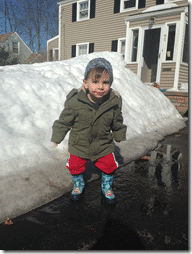My wife says I have an excellent memory. I’ve never thought so, but it’s true that I can lock a story into my mind and manipulate it onstage without much difficulty.
That said, my visual memory is almost nonexistent. My wife also says that if she were placed in a lineup with five other brunettes, I would be hard pressed to pick her out of the group.
An exaggeration, of course, but not far from the truth.
She also says that I remember my childhood in a way that few others do. My sister is the same way, if not more so. I’ve often wondered why people seem to remember so little from their childhood while I seem to remember so much.
I recently came up with a theory.
I grew up in a world that was often entirely absent of adults. My siblings and I were left on our own for large swaths of time. At an early age, I would leave the house at an early hour and often not return until dinnertime. I would babysit my brothers and sisters into the wee hours of the morning. We were given responsibilities and freedoms as children that would result in endless strings of DCF calls today.
Our parents didn’t engage in long discussions with us, and we were often in the dark about many things. There was no mention of the birds and the bees. There was no talk about our future. There were entire school years when my report cards went unread. There was a great division between child and adult in our home, and rarely was this division breached. This led to many challenges, much turmoil, and a constant need for problem solving and improvisation on my part.
In short, the way that I was raised (or not raised) led to many unique experiences and trouble.
My wife, by contrast, spent vast amounts of time with her parents. They drove to the Berkshires every weekend. Visited family often. Spent time together at the beach near their Berkshire home. Established traditions and routines that remain to this day.
My wife had a childhood of consistency, nurturing, and adult supervision. It was the kind of childhood that I hope for my children.
Perhaps my wife remembers less about her childhood because it was so consistent. So measured. So safe. Each day and each year resembled the next in a way that mine never did.
This is not to say that she led a boring or uneventful childhood. It was simply more predictable and tradition-based. She remembers much of her childhood through a gauzy shade of warmth and happiness. She recalls fewer specifics but has much more affection for the way that she was raised.
If you don’t spend your childhood lost in the woods, exploring the basements of burned-out farm houses, swimming unsupervised in cow ponds and stranger’s swimming pools, riding your bike for miles and miles from home, trespassing on construction sites, fighting, and living in a perpetual state of trouble and endless struggle, you are probably less likely to have the kinds of singular experiences that are piled high in my mind.
Perhaps I remember my childhood better than others because every day of my childhood was a new adventure. This is not to say that these adventures were welcomed or advised or even fun.
But they were certainly memorable.







